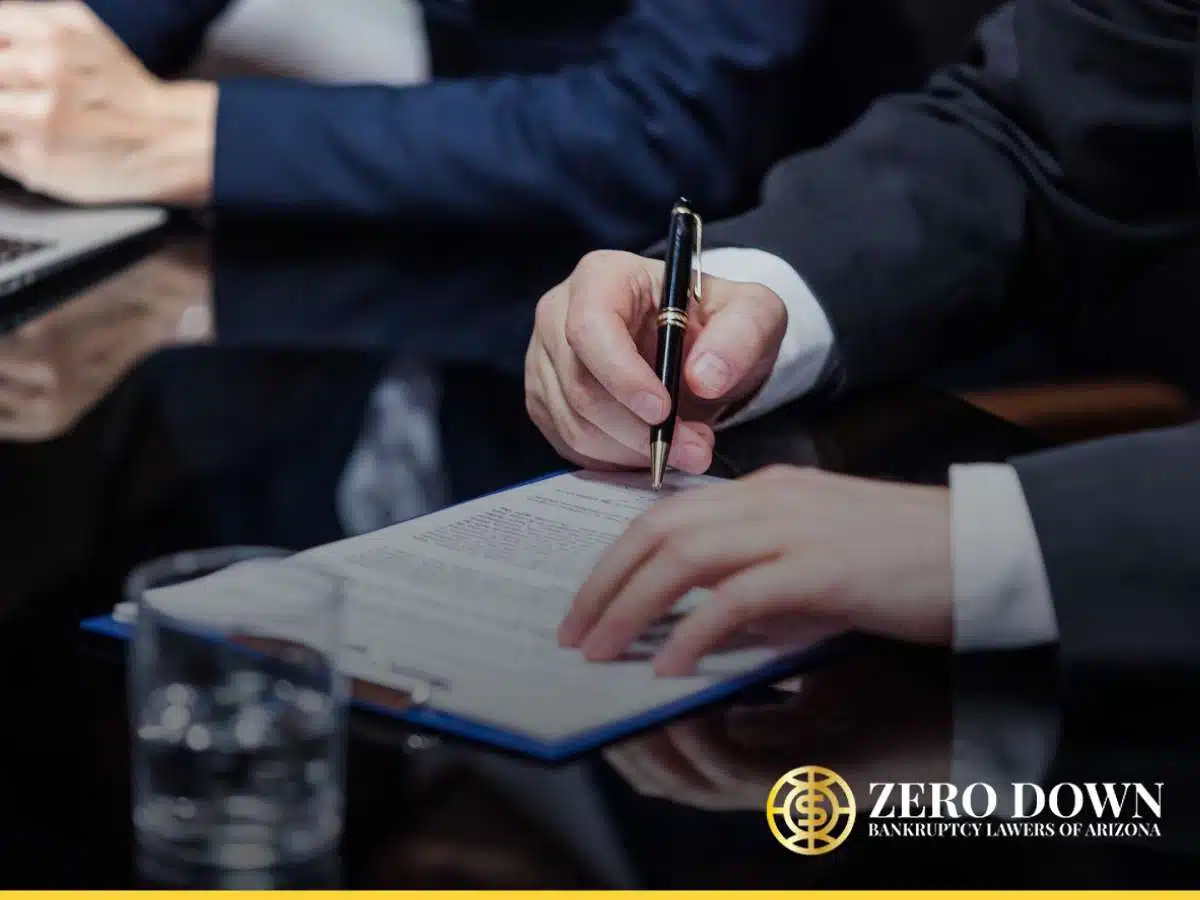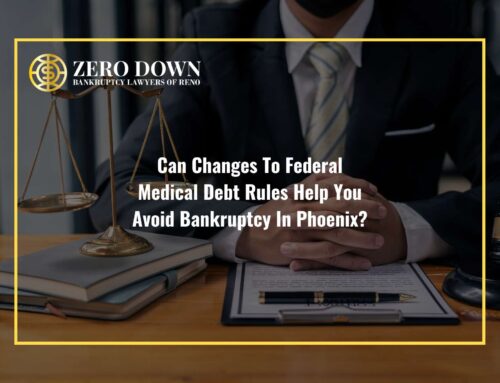One of the most common reasons we see potential clients come in is because they are at risk of losing their vehicles. Your vehicle may be the only feasible way for you to get to work, or even complete your job’s duties. Losing it could mean lost wages on top of the expenses of procuring a new vehicle, and possibly dealing with a repossession deficiency. Thankfully, bankruptcy can provide a safety net to stop a creditor from proceeding with a vehicle repossession. It even provides unique options for those whose vehicles have already been repossessed, as long as they act quickly. If you want to protect your vehicle from repossession in bankruptcy, it’s important that you understand reaffirmation agreements. Let our experienced Tucson bankruptcy lawyers guide you through your options with your free phone consultation call 602-609-7000 to get started today.
What Is A Reaffirmation Agreement?
A reaffirmation agreement is a payment contract mostly seen in Chapter 7 bankruptcy. Its purpose is to protect financial agreements between creditors and bankruptcy debtors who are clearing their legal obligations to repay debt in Chapter 7 bankruptcy. Most often, a reaffirmation agreement will be used to solidify a payment plan on a bankruptcy debtor’s financed vehicle. However, a reaffirmation agreement can technically be used on several types of loans for a bankruptcy debtor. It creates a legal obligation for the debtor to repay the loan despite a bankruptcy discharge. It also protects the debtor from having the reaffirmed asset seized by the bankruptcy trustee. Without the proper reaffirmation agreements, a bankruptcy case can become much more complicated than it needs to be.
Requirements For A Valid Reaffirmation Agreement
If a reaffirmation agreement isn’t legally valid, it could put either party at risk. One of the requirements for a valid reaffirmation agreement is that it must be filed within 60 days of the 341 Meeting of Creditors. If the 341 Meeting of Creditors is rescheduled or delayed, the 60-day time limit from the original hearing date will still apply. Only the court can give permission to extend that period. The debtor must include a cover sheet with their reaffirmation agreement. The debtor must also include statements regarding their income and expenses. If the information provided in the statements doesn’t match the information provided in the bankruptcy petition, the debtor must submit an explanation for this discrepancy.
Reaffirmation & Chapter 7
The most frequently filed type of bankruptcy in Tucson is Chapter 7. Chapter 7 bankruptcy clears several types of debt, which will make the life of someone with financial struggles generally much easier. If someone who meets the eligibility requirements for Chapter 7 has credit card debt, medical bills, personal loans, old taxes, repossession deficiencies, unpaid utility bills, and more, Chapter 7 could be an invaluable tool to rebuilding a positive financial future. However, there are several types of debts that will remain largely unaffected by filing for Chapter 7 bankruptcy. Student loans, secured debts like home mortgages and auto loans, newer tax debts, and more will all remain after a Chapter 7 bankruptcy discharge. Collections like wage garnishments, home foreclosures, and vehicle repossessions will all be paused until the Chapter 7 case is discharged or dismissed. If the debtor is being garnished for child support, the debt will not be discharged by Chapter 7 bankruptcy nor will the garnishment be stopped by the automatic stay.
If Chapter 7 is the right fit for a debtor and they have an auto loan, the debtor should be aware that their auto loan balance won’t be discharged. If the vehicle has already been repossessed, a Chapter 7 bankruptcy can discharge a repossession deficiency. If the debtor wishes to surrender the vehicle, they can discharge their auto loan. But there is no way to keep a financed vehicle in Chapter 7 without paying off the balance, and this usually must be done with a reaffirmation agreement.
Reaffirmation & Chapter 13
A reaffirmation agreement isn’t as necessary in a Chapter 13 bankruptcy as it is in a Chapter 7 bankruptcy. That’s because the total balance of most secured debts, including auto loans, must be paid off in a Chapter 13 payment plan. Depending on the loan’s balance and the payment plan’s length, this could extend or decrease the loan’s term. If the debtor stays current on their plan payments, the automatic stay from filing bankruptcy will remain in good standing, preventing the lender from repossessing the vehicle. A reaffirmation agreement may only provide a safety net in case the debtor’s bankruptcy is dismissed, their automatic stay is interrupted, they miss a payment, etc.
What Will Happen If I Don’t Reaffirm My Car Loan In Bankruptcy?
If you don’t enter into a reaffirmation agreement with your vehicle lender in your bankruptcy, there will technically no longer be a payment contract after the case has been discharged. Some bankruptcy debtors get by with continuing to make their auto loan payments as usual. This can be the simpler option, especially if the debtor is close to the end of their vehicle’s payment plan. But especially when there is a significant balance remaining, the debtor should keep some special considerations in mind. First, a vehicle lender is no longer required to report to the credit bureau after a bankruptcy, and likely won’t unless for negative purposes. Secondly, and most likely more pertinent here, without a valid payment contract, the vehicle lender can technically repossess at any time- even if you have made your payments. A reaffirmation agreement provides a safety net not just for the lender but for the bankruptcy debtor as well.
Do I Need To Reaffirm Loans For Smaller Assets?
Houses and vehicles aren’t the only type of assets that are commonly sold with financing. Your cell phone may have been rolled into monthly payments along with the rest of your mobile plan. It also isn’t uncommon to see debtors who have financed household goods like furniture and appliances. Most of the time, it isn’t worth it for the lender to come repossess these types of assets. For example, a lender probably won’t be able to resell a used, repossessed mattress for much more than the cost of the actual repossession. However, this is never a guarantee, and if there is a large balance remaining on the loan of any financed asset, a bankruptcy debtor is at risk of repossession without a reaffirmation agreement. If you have items around the home financing, you should discuss these concerns with an experienced bankruptcy attorney before filing.
Tucson Bankruptcy Lawyers For Reaffirmation Agreements & More
A reaffirmation agreement could be just one of the special factors that makes your case unique from a so-called “standard” bankruptcy. These issues could make your case more prone to delays, extra fees, dismissals (whether they be temporary or permanent), and more. Our Tucson bankruptcy team can guide you through issues like reaffirmation agreements and any other obstacles that may be relevant to your case. Our dedicated staff at Zero Down Bankruptcy Lawyers of Arizona offer flexible appointments and rates designed to fit in anyone’s budget. We even offer payment plans that can begin after your case has been filed. To get started with your 100% free phone consultation, call 602-609-7000.
Arizona Offices
Phoenix Location:
343 W Roosevelt Street, Suite #100
Phoenix, AZ 85003
Email: [email protected]
Phone: 602-609-7000
Mesa Location:
1731 West Baseline Rd., Suite 101
Mesa, AZ 85202
Email: [email protected]
Glendale Location:
20325 N 51st Avenue, Suite #134
Glendale, AZ 85308
Email: [email protected]
Tucson Location:
2 East Congress, Suite #900
Tucson, AZ 85701
Email: [email protected]











